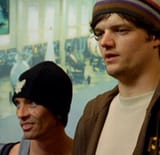Anonymous
6/17/2025, 10:15:23 PM No.935906035
Setting: A dimly lit prison interview room at Kentucky State Penitentiary. Fleece Johnson, a convicted felon known as the “Booty Warrior,” sits across from MSNBC reporter Sarah Mitchell. The interview is part of a special segment titled “Systemic Shadows: The Prison Experience.”
Sarah Mitchell: Good evening, Mr. Johnson. Thank you for joining us to share your perspective on life inside. Many viewers may know you from your 2008 interview, where you spoke candidly about prison dynamics. Can you start by explaining what life is like here?
Fleece Johnson: “In this prison, bty was more important than food. Bty. A man’s bt. It was more important than, I’m serious, bty, having some b**ty, was more important than drinking water, man.”
Sarah Mitchell: That’s a striking statement, Fleece. It sounds like the environment here creates intense pressures. Would you say the prison system, shaped by broader societal forces like capitalism’s neglect of rehabilitation or systemic racism, pushes individuals toward such extreme behaviors?
Fleece Johnson: I ain’t sayin’ all that. It’s just how it is in here. You see a man, he look good to me, I go up to him. I say, “Hey, you. Come here. I say, imma tell you what, I like you and I want you. We can do this the easy way or the hard way. So the choice is yours.” And it was always a yes.
Sarah Mitchell: That dynamic sounds coercive, but let’s contextualize it. The prison system often fails to address root causes like poverty or racial inequities, which can trap people in cycles of desperation. Could you argue that your actions were a response to a system that dehumanizes inmates, leaving you with little control?
Fleece Johnson: I don’t know about all that control stuff. I see what I want, I take it. Like, they got this thang where they sag their pants past their butt. (continued)
Sarah Mitchell: Good evening, Mr. Johnson. Thank you for joining us to share your perspective on life inside. Many viewers may know you from your 2008 interview, where you spoke candidly about prison dynamics. Can you start by explaining what life is like here?
Fleece Johnson: “In this prison, bty was more important than food. Bty. A man’s bt. It was more important than, I’m serious, bty, having some b**ty, was more important than drinking water, man.”
Sarah Mitchell: That’s a striking statement, Fleece. It sounds like the environment here creates intense pressures. Would you say the prison system, shaped by broader societal forces like capitalism’s neglect of rehabilitation or systemic racism, pushes individuals toward such extreme behaviors?
Fleece Johnson: I ain’t sayin’ all that. It’s just how it is in here. You see a man, he look good to me, I go up to him. I say, “Hey, you. Come here. I say, imma tell you what, I like you and I want you. We can do this the easy way or the hard way. So the choice is yours.” And it was always a yes.
Sarah Mitchell: That dynamic sounds coercive, but let’s contextualize it. The prison system often fails to address root causes like poverty or racial inequities, which can trap people in cycles of desperation. Could you argue that your actions were a response to a system that dehumanizes inmates, leaving you with little control?
Fleece Johnson: I don’t know about all that control stuff. I see what I want, I take it. Like, they got this thang where they sag their pants past their butt. (continued)



